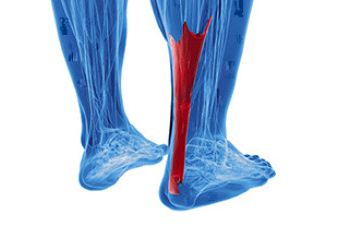
Achilles tendonitis is an ailment affecting the long tendon that connects the leg bones to the heel. This condition is particularly common among those engaged in high-impact activities, like running and jumping. The Achilles tendon's susceptibility to inflammation due to repetitive stress often leads to microtears and thickening. This results in Achilles tendonitis, which is characterized by posterior ankle pain and stiffness. However, the more severe consequence, an Achilles tendon rupture, typically occurs during forceful movements which result in sudden, intense pain and the inability to bear weight. Approximately 80 percent of Achilles tendon ruptures result in complete loss of function in the calf muscle. If you are experiencing pain in the Achilles tendon, it is suggested that you cease the activity causing the pain and make an appointment with a podiatrist as soon as possible. This foot doctor can conduct a thorough exam and determine the appropriate treatment.
Achilles tendon injuries need immediate attention to avoid future complications. If you have any concerns, contact one of our podiatrists of Toms River Podiatrist . Our doctors can provide the care you need to keep you pain-free and on your feet.
What Is the Achilles Tendon?
The Achilles tendon is a tendon that connects the lower leg muscles and calf to the heel of the foot. It is the strongest tendon in the human body and is essential for making movement possible. Because this tendon is such an integral part of the body, any injuries to it can create immense difficulties and should immediately be presented to a doctor.
What Are the Symptoms of an Achilles Tendon Injury?
There are various types of injuries that can affect the Achilles tendon. The two most common injuries are Achilles tendinitis and ruptures of the tendon.
Achilles Tendinitis Symptoms
- Inflammation
- Dull to severe pain
- Increased blood flow to the tendon
- Thickening of the tendon
Rupture Symptoms
- Extreme pain and swelling in the foot
- Total immobility
Treatment and Prevention
Achilles tendon injuries are diagnosed by a thorough physical evaluation, which can include an MRI. Treatment involves rest, physical therapy, and in some cases, surgery. However, various preventative measures can be taken to avoid these injuries, such as:
- Thorough stretching of the tendon before and after exercise
- Strengthening exercises like calf raises, squats, leg curls, leg extensions, leg raises, lunges, and leg presses
If you have any questions please feel free to contact our office located in Toms River, NJ . We offer the newest diagnostic tools and technology to treat your foot and ankle needs.
